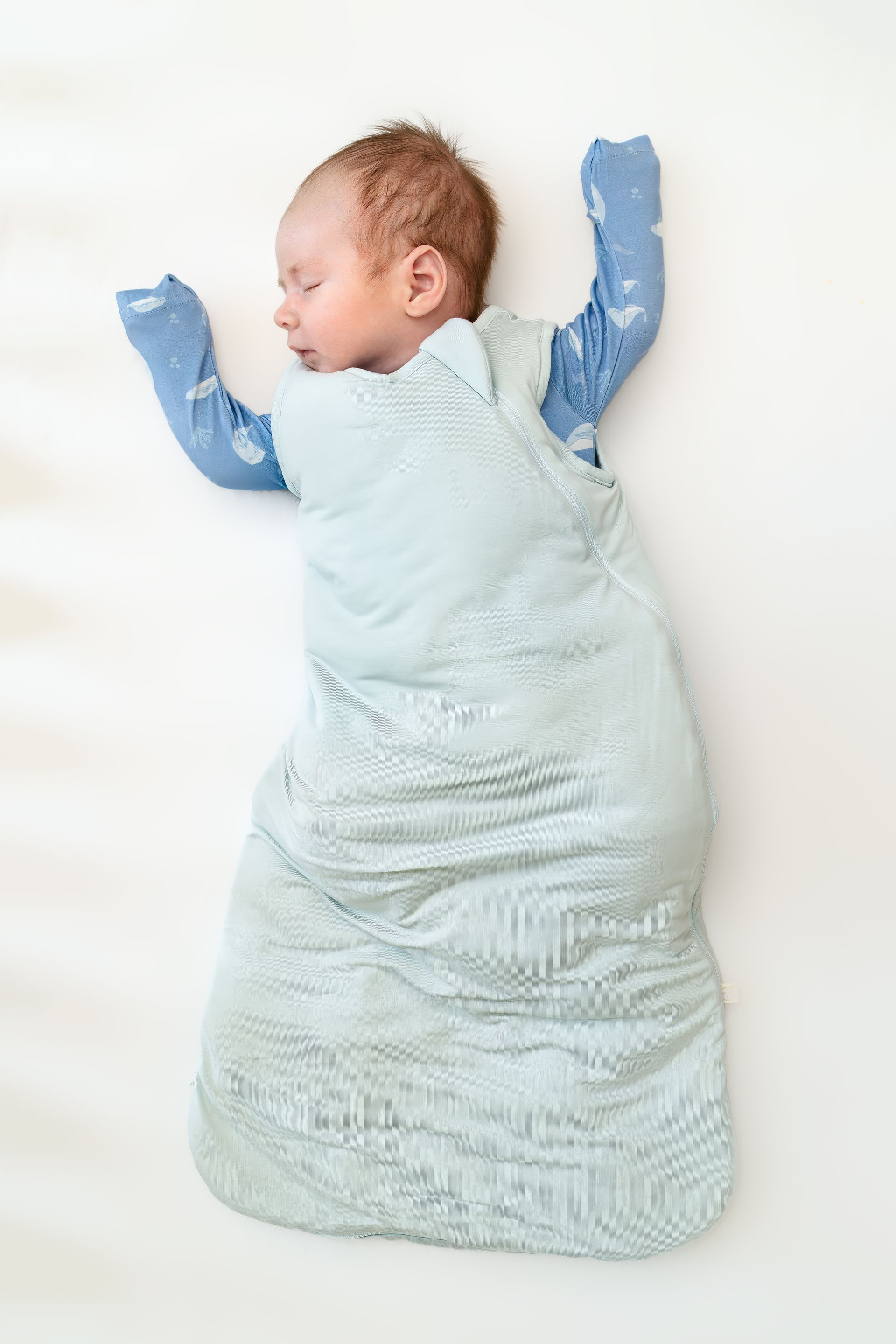Busting 5 Common Sleep Myths
lbenjell • November 8, 2021
Raise your hands if you’ve been asked if you’ve been asked if your baby was a “good sleeper”. Keep them up if you’ve been asked if they “slept through the night”… And keep them up if you answered no and somebody gave you unsolicited advice about how to achieve the holy grail of parenthood, or sleeping through the night. I’m sure that most of you had your hands up throughout the entire exercise. If you’ve been a mama for a hot second, you know that we need all the advice we can get, but only if we ask for it and ONLY if it is good or accurate advice. No unsolicited advice please, and definitely no second-source stories or how your second cousin once removed’s baby slept through the night from the day he became 6 months old.
I’ve seen and worked with enough babies to see that no baby is like the other, and no solution fits all. Each family has their own ways and their own systems and what works for one may not work for the other. But what I know for sure is that your baby’s sleep is not a reflection of your motherhood. You are not a “bad” mother because your baby is a “bad” sleeper. If those tags or adjectives can even ever be used (maybe a topic for another blog?).
I think an important part of being able to even be a parent is to have access to good reliable information. Knowledge empowers us to make good decisions.
Myth : Keep baby up during the day, they will sleep better at night
Fact: Naps are an important element of your baby’s sleep needs. A baby who does not nap properly during the day will most likely be awake for longer periods than they can tolerate and will not get the number of hours of sleep that they need. This means that baby will be overtired at bedtime, leading to fussiness, resistance to sleep and difficulty staying asleep.
Myth : They will sleep when they are tired
Fact: When babies are tired and sleep deprived, they will produce more cortisol than they need to which will make them more active and alert. This means that waiting for your baby to feel tired and decide to fall asleep, without providing them the opportunity to go to sleep will backfire.
Myth : Feed them formula or solids to sleep better
Fact: There is no evidence linking a heavier/certain type of feed will guarantee that your baby will sleep better. It is important that your baby gets the appropriate calorie intake in order to feel full but that does not have to be concentrated right before bed, it can be evenly spread out throughout the day. And the kind of feeding will depend on their age and developmental needs. But feeding a baby a heavy meal right before going to bed will likely cause more harm than good as baby’s digestive system will be working hard at processing that food intake which will likely interrupt their sleep. Imagine eating a double portion of your usual meals right before dozing off. What will that do to your sleep?
Myth : Don’t let your baby get used to sleeping in your arms
Fact: Newborns need their parents’ help to navigate the world. They need help to feed, stay clean and warm, they also need help to sleep. As they grow, they develop the capacity to learn to sleep and you can do that should you wish to. But rocking/holding/feeding to sleep are perfectly good ways to put baby to sleep as long as it is making you and baby happy.
Myth : Your baby will outgrow this
Fact: There is no certain age by which all babies learn to sleep through the night. Some will come to it when certain conditions are met and others will not. Of course, certain developmental prerequisites are needed to help baby do that but there is no particular age at which your baby will definitely sleep better.

Choosing a car seat is one of the most important decisions you’ll make as a parent. It’s not just about convenience — it’s about giving your child the best protection on every journey . In the UAE, where we drive long distances, face busy roads, and deal with extreme heat, the right car seat matters more than ever. But with so many options, how do you know which one to choose? Here are our top 4 tips to make car seat shopping easier — and safer. 1. PRIORITIZE SEATS THAT UNDERGO THE TOUGHEST CRASH TESTING Not all car seats are created equal. Many parents think if a seat is “legal,” it must be safe — but that’s not always true. ECE R44 : The most basic standard, now phased out in Europe. ECE R129 (i-Size) : Stricter testing with better head, neck, and side-impact protection. The Swedish Plus Test : The toughest crash test in the world — and the gold standard. What makes the Swedish Plus Test so important? It’s the only test that measures neck forces on a child’s body in a crash. Seats that pass prove they can keep neck loads below dangerous limits — a key factor in preventing serious injury. Many car seats fail completely under this extreme test, which shows just how high the bar is. 👉 If a car seat has passed the Swedish Plus Test , you can be confident it offers the highest level of safety for your child. 💡 Remember: Legal does not always mean safe . Go beyond the minimum. 2. CONSIDER YOUR CHILD'S HEIGHT, WEIGHT, AND AGE — EVEN THE SMALLEST ONES Every child grows differently, and size matters when it comes to safety. Preemies and smaller babies : Standard carriers often don’t provide the right fit. They need extra support for the head, neck, and body, plus proper harness positioning. Twins or multiples : Planning seating for two (or more) at once requires careful choice so every child gets the safest setup. As children grow, their height and weight percentiles determine how long a seat will last. We recommend car seats with at least a 25kg weight limit and 125cm height limit , which allow for extended rear-facing travel . Why rear-facing ? Research shows it is up to 5 times safer than forward-facing for children up to 6–7 years old. Better crash force distribution across the strongest part of the body. Superior head and neck protection , preventing the whip-forward motion that can cause spinal injury. Cocoon-like shell protection against front and side impacts. 💡 Bonus for UAE parents: The BeSafe Go Beyond with Preemie Inlay was designed with neonatal nurses to support even the tiniest babies. It features a removable wedge for better harness fit and breathable mesh fabric — keeping your baby safe and cool in our hot weather. 3. MATCH THE CAR SEAT TO YOUR CAR AND LIFESTYLE Your car seat needs to fit not just your car — but your daily routine . Multiple cars? Choose a seat that’s easy to install/uninstall. Growing family? Invest in a seat with a long lifespan that can be passed down. Seat placement? Consider if it will go behind the passenger, in the middle, or side by side with another child seat. Bigger families? Narrow but safe seats can fit 3-across or work well in 7-seaters, without compromising protection. Example from our family setup: Mummy’s car : BeSafe Flex Fix 2 for Sofia (8y) + BeSafe Stretch for Leo (5y). Daddy’s car: Axkid One3 for Leo + BeSafe Flex Fix 2 for Sofia. The Axkid One3 was chosen because Daddy often removes the seat, and installation takes under 30 seconds . 👉 Key takeaway: The “best seat” isn’t the one your friend uses — it’s the one that fits your child, your car, and your lifestyle . 4. DON'T COMPROMISE — BUY FROM A CHILD CAR SEAT SPECIALIST Buying from a specialized retailer ensures peace of mind: They recommend a seat that fits your child, car, and routine . They install it correctly and show you how. If the seat doesn’t fit, they won’t install it — and they’ll help you find one that does. They’ll reinstall it whenever you need , for example when changing cars, at no extra cost. At Safety On Board , we offer 1-1 car seat consultation and hands-on support to make sure your child rides safely every time. FINAL THOUGHTS A car seat isn’t just another baby item — it’s life-saving equipment. Whether you’re bringing home a preemie, juggling twins, or moving a big kid into a booster, the right seat + the right suppor t makes all the difference. If you’re unsure where to start, contact us and book a consultation with us. We’ll help you find the perfect fit for your child, your car, and your family. Because every child in the UAE deserves the safest ride 💛 Sophie Huang is the founder of Safety on Board , the UAE’s first child car seat specialist. She is also a mom of 2 and an internationally certified car seat expert . With a passion for keeping children as safe as possbile on UAE road, she guides parents in choosing and installing the safest car seats. Sophie believes safety can be simple, stress-free, and empowering for every parent.

There’s something magical about a beach holiday — the sound of waves, salty air, and the promise of slow days in the sun. But let’s be honest: traveling to the beach with a baby isn’t exactly a vacation unless sleep is part of the equation. Whether you're heading to a resort, renting a seaside villa, or visiting family by the coast, here’s how to set your baby up for restful sleep — so everyone gets to enjoy that ocean breeze. Step 1: Know That Sleep Needs Don’t Take a Holiday Babies are creatures of habit. Their little bodies thrive on rhythm and predictability — even on vacation. But that doesn’t mean you can’t have fun or go with the flow! It just means that your baby’s sleep needs are still there, and the better prepared you are, the easier it will be to keep things (mostly) on track. Step 2: Your Beach Baby Sleep Packing List Here’s your ultimate baby sleep packing list for a beach trip, broken down by category: Sleep Environment Essentials : Portable travel crib or bassinet – Choose one your baby is already familiar with if possible. Fitted sheets – Bring 2-3 just in case of sand, spills or spit-up. Also bring a gently used one to remind baby of home as he/she adjusts to the new sleep environment. Portable blackout blinds – Beach homes and rentals often have light, sheer curtains. White noise machine or app – Helps block out unfamiliar sounds like waves (yes, they can be loud!) or street noise. Baby monitor (if you’ll be in a larger space or stepping outside during naps). For more on the ideal sleep environment, have a read here . Comfort + Routine : Lovey or comfort object (if age-appropriate and safe for sleep). Sleep sack – Choose a breathable, summer-weight one. Favorite bedtime book – Familiarity brings comfort. Pacifiers – Always bring extras! Nightlight – A soft, warm one if needed for feeds or changes during the night. Weather + Climate Considerations : Lightweight, breathable pajamas – Think cotton or bamboo Fan – If your rental lacks good airflow or AC Bonus Tip: Have a “Nap-on-the-Go” Kit **For beach days that cut into nap time: Clip-on stroller fan Stroller or baby carrier your baby can sleep in Portable white noise machine Extra sun hats + baby-safe sunscreen (for after 6 months old) Step 3: Keep the Routine (Even on the Coast) Try to mirror your bedtime routine as closely as you can. If you usually do bath → PJs → book → feed → sleep, stick with it — even if it’s a quick version. Babies love the predictability, and it helps signal that it’s time to wind down, even in a new environment. Also, aim for naps in a darkened room when possible, especially after a stimulating beach outing. And if one nap has to happen in the stroller under a palm tree? That’s totally okay. Just go back to the routine as soon as you can. Getting There: Travel Day Tips Time your departure around naps if possible Use familiar sleep items (like the sleep sack or pacifier) during flights or drives Offer extra feeds — travel is dehydrating, especially in hot weather Keep expectations flexible – sleep may not be perfect, and that’s fine Beach trips with a baby can be full of joyful memories and restful nights — as long as you plan for sleep. With the right gear and mindset, your little one can stay well-rested and content, giving you more time to soak up the sun (or at least drink your coffee while it’s still warm!). And remember: sleep doesn’t have to fall apart just because you’re away from home. If you ever feel stuck or unsure about how to adjust things before, during, or after a trip, I’m here to help you build a personalized plan that fits your family’s travel style. Book your discovery call here .

October is SIDS Awareness Month, dedicated to raising awareness about Sudden Infant Death Syndrome. It’s a time to educate parents and caregivers on safe sleep practices that can reduce the risk and help protect our little ones.. At Hushabye, safety is at the heart of our brand. Our focus is on providing parents with safe and high-quality baby sleepwear, such as sleep bags, that offer a safer alternative to traditional blankets. What is a baby sleep bag? A baby sleep bag, also known as a wearable blanket or sleep sack, is a specially designed garment for infants and young children to wear during sleep. The primary purpose of a sleep bag is to keep the baby warm and comfortable, but it also serves as a safe and convenient alternative to traditional blankets and quilts in a crib or cot.


